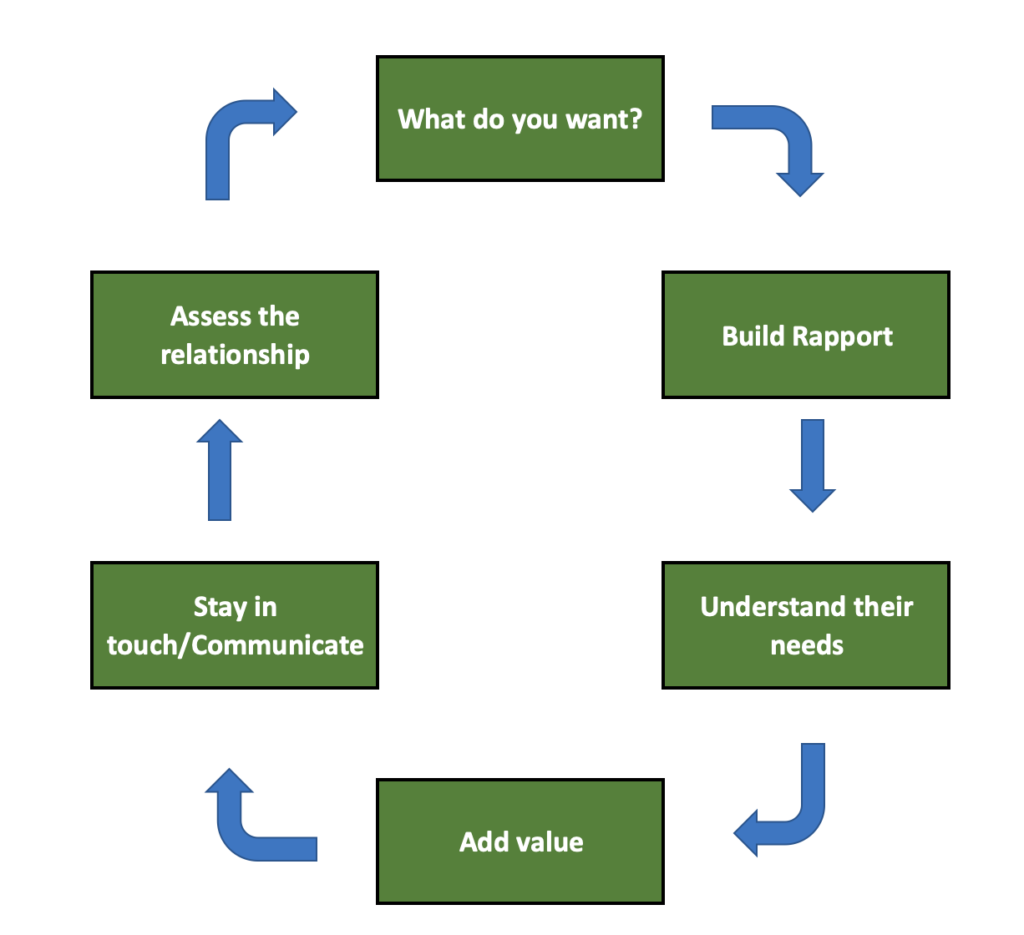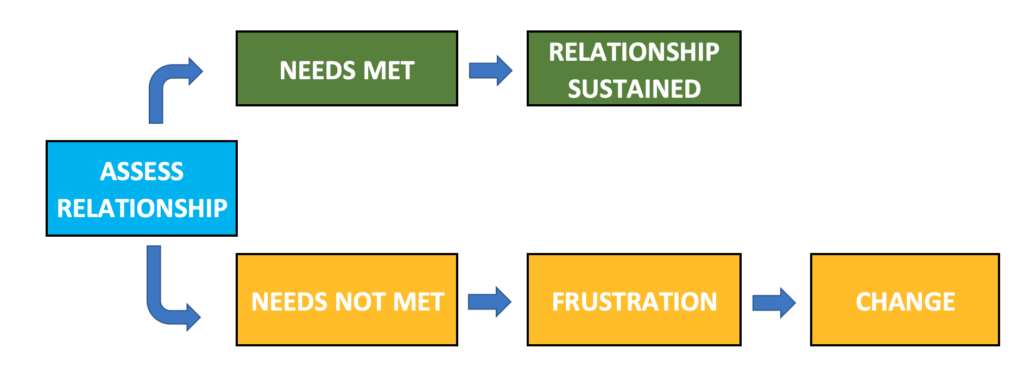
The relationship building process follows a series of steps that foster an association between several participants that is developed over time and is mutually beneficial.
Typical steps within the process include:
- Determining the objective of the relationship
- Building rapport
- Understanding their needs
- Adding value
- Maintaining the relatinship
- Assesing the relationship
Each step within the process requires a set of principles and skills that we recently touched on in our article on Relationship Building skills.
In this article, we’ll be reviewing the relationship building process in detail and look at how you can apply it to your relationships within your workplace.
We will be covering:
- The Relationship building process
- Relationship building skills
- Three key work relationships
- Why relationships need patience
- Making sure needs are met
- Avoiding negative habits
- The importance of boundaries
The Relationship building process
A typical relationship building process will follow a series of six steps:

Step 1 – Determining your objective
Let’s start with some pertinent questions:
- How would you describe your relationships with your work colleagues?
- Do you have good relationships with colleagues?
- Do you have poor relationships with colleagues?
- How do your relationships compare with others in the workplace?
- Do you want to improve your relationships?
- Do you want to foster good relationships with key team members?
- What is your objective for building a particular relationship?
- Can you describe the value you want to obtain from the relationship?
By asking yourself questions like these, you can determine your objective and be able to qualify if your relationship(s) is delivering what you need.
Let’s look at some examples of the sort of values positive relationships can provide:
- Someone to talk to when times are stressful
- Someone to help with tasks to achieve goals
- Help with developing ideas or brainstorming
- Helping with career opportunities
- Helping to influence other stakeholders
Whatever the basis of the relationship, there is always an objective or a form of value to be exchanged, whether that’s material or emotional.
Stating the obvious, the goal or objective will vary from one relationship to another.
Step 2 Build rapport
Rapport is defined as:
“a good understanding of someone and an ability to communicate well with them.” (https://dictionary.cambridge.org/dictionary/english/rapport)
So building rapport is the process of developing a connection with someone else. Rapport does not generally happen instantly and will require work and patience. With some, it may happen quickly; with others, it might take time.
Sometimes there is that immediate spark, and we get on with someone very quickly. We may have things in common that can help facilitate this, i.e., interests, backgrounds, etc.
However, even when we don’t share these things, rapport can be built; it just takes a little effort, some skills, and some patience.
Step 3 Understand their needs.
Part of building a successful relationship is that both sides receive a level of value from it.
Just like you are seeking value, the other side of the relationship will be too.
Step 3 is all about determining what that value might be.
In some cases, the easiest method is to ask (i.e., “what can I do for you?” or “how can I help”). But this is not always possible or appropriate.
As a result, you may be required to utilize some soft skills in determining what they are seeking, for example
- Listening
- Communicating
- Problem-solving
- Empathy
- Situational awareness
- Etc
Using these skills should enable you to build a picture of what the other person(s) are looking for and determine how you can achieve it.
Step 4 Add value/Receive Value
The next stage is to add value to the relationship.
We do this by delivering things that meet the other parties’ needs.
For example, you may be nurturing a relationship where the other party may require the value of having someone to discuss difficult issues with.
This example will require you to schedule time with the other party and utilize a series of skills that will help deliver the value required.

You also require value for a relationship to develop.
You’ll need to find a way of communicating what this value is and help facilitate this where required (i.e., by scheduling time with the other person).
This step gives us perspective on our relationships, helping us consider what is important, why certain relationships matter, and what purpose they serve.
Step 5 Connecting/Nurturing
Most relationships will have ups and downs, they will develop at their own pace (some faster than others), and you’ll require patience and dedication in order for them to be sustained.
A fundamental enabler to nurturing a relationship is merely connecting with the other person.
Scheduling time with people and sharing moments with them is perhaps the best skill you can utilize in nurturing relationships.
It’s important to recognize the time you have is not infinite, and a level of prioritization will be required.
Some individuals/groups are likely to take priority over others.
Step 6 – Assess
The final step, perhaps one we often do sub-consciously throughout a relationship, is to assess the relationship’s health.
- Is it giving you what you want?
- Is it fair?
- Is it adding value to all parties?
- Is the effort taken in maintaining the relationship equal to the value being delivered?
- Is the connection still important?
Assessing the relationship often uncovers changes that are needed, in many cases, looking to where the relationship can be improved?
Sometimes this step is merely a self-assessment of what’s working and what’s not; often, it will require engagement with the other part of the relationship or other stakeholders in order to make changes; sometimes this can be difficult, requiring careful use of soft skills and emotional intelligence.
Relationship building skills
You can check out our detailed article on Relationship building skills here but in summary, we are likely to utilize several soft and hard skills. These core skills help deliver a positive relationship.
These include:
- Communication – The ability to communicate effectively, openly, and honestly
- Self-awareness – Knowledge of your own behaviors and character and how they impact relationships.
- Trust – Characterized by reliability, honesty, integrity
- Respect – Illiciting appreciation and approval through abilities and qualities
- Inclusion – A level of openness and equality to all
Three key work relationships
Given that time is not infinite, you are likely to need to prioritize.
Which relationships at work require the most focus?

Obviously, that will depend on you, but it could be argued that there are a number of key relationships that require the most attention.
These are:
- The relationship with your boss
- The relationship with others in your team
- The relationships with your stakeholders
Why relationships need patience
It’s important to recognize that none of this happens overnight; you need to consider that relationships will take time from the outset.
Some may happen quicker than others, but no relationship is likely to happen immediately.
Aspects such as trust can take time to demonstrate, as do appropriate characteristics that are required to cement relationships.
Making sure needs are met
Remember that the key driver behind relationships is an exchange of value.
While developing relationships, you’ll need to assess their success regularly.

Are you getting what you need from the relationship? Are some facets of the relationship not working? What can be done about it? How do things need to change?
By constantly appraising your relationships, you are more likely to build better ones.
Avoiding negative habits
As we stated earlier, all relationships are likely to have their ups and downs; managing relationships during their “down” periods can be hard work.
We may become frustrated and think we need to express this. One way that we do this is we can gossip or talk negatively about others.
Clearly, the rule should be to avoid office politics and “us and them” approaches; rarely do they benefit you.
The importance of boundaries
The final point is to be aware of boundaries.
Boundaries exist on both sides of the relationship, and you need to be aware of both sides.
Boundaries are a positive thing and help prevent relationships from becoming damaging; without them, it’s very easy for relationships to go bad and for one party to be taken advantage of.
Summary
Building great relationships takes two things, skills, and a process.
Relationship building is a cyclical process that requires effort and consideration on both sides with constant tuning and focus.
Relationships have various key enablers, including:
- Time
- Understanding
- Communication
As time is limited, you are likely to focus on a small number of relationships within the workplace, primarily with those around you.
Relationships are not likely to have a flat trajectory, and you are likely to have good relationships as well as bad ones.
It’s important that you don’t participate in negative behavior and that you have an awareness of boundaries on all sides.
We hope you’ve found this piece informative; we’d like to ask… how do you develop your relationships?
Do you believe certain key skills are more important than others or that certain elements of the process require the most focus and attention?
We’d love to hear from you, as always you can tweet us @sanbustrain or use the comments section below.
This article is part of our Human Resources Guide.